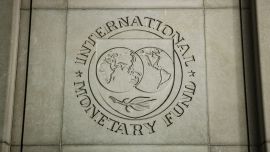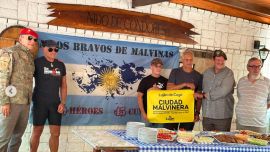A series of looting attacks on supermarkets and shops across Argentina, allegedly organised by groups in working-class neighbourhoods or by nefarious political operators, have led to the arrest of nearly 200 people.
The unrest has fuelled political debate in the midst of an inflationary spiral, just 60 days before October’s general elections take place.
1) What happened?
Events began last Friday. Groups of assailants, supposedly summoned on social networks, forcibly entered supermarkets and other shops and stores. They robbed items and caused damages in the provinces of Buenos Aires, Mendoza, Córdoba, Neuquén and Río Negro. At least one store in Buenos Aires City was also targeted, though the attack was repelled by neighbours.
Official reports at press conferences confirmed 150 attempts to loot and 94 arrests on the outskirts of the capital. In Mendoza there were 66 arrests. “They were criminals acting in an organised manner, with minors involved,” said the provincial government.
Córdoba prosecutor Ernesto de Aragón said that “there were 23 arrests due to different attacks to shops” in the region. There were also more than 10 arrests in the provinces of Neuquén and Río Negro.
2) Who has been blamed for the attacks?
Veteran picketer and social leader Raúl Castells said on television: “People are out looking for food, and if they don’t find it, we’re calling for this, we’re telling them that, without stealing money or breaking anything, to take whatever they can, to swap for food.”
The AFP news agency reported this week that videos had begun circulating on social media of previous acts of looting. The events, though isolated, were reminiscent of violent acts committed during the governments of Raúl Alfonsín, back in 1989, and Fernando de la Rúa, back in 2001. Nevertheless, actual attempts at pillaging and robbery were confirmed by the police and the media this week and some videos circulating online were recorded this week.
According to Buenos Aires Province Governor Axel Kicillof “neighbours did not take part in this en masse. On the contrary, many of them tried to prevent them [the attackers] from carrying out these actions.”
3) How did the government and opposition react?
Peronist President Alberto Fernández, who is not running for re-election, considered the looting to be “organised events.” He said Wednesday he would “guard democratic cohabitation” and promised to take care of “the problems of the Argentine people and their income,” but asked them “to please preserve social peace.”
Going on the attack, the president’s spokesperson, Gabriela Cerruti, said to the press that opposition candidates Javier Milei and Patricia Bullrich were “building their speeches on the basis of nostalgia for a crumbling and destabilised democracy.”
Milei, the top candidate in the August 13 presidential primaries (with 30 percent of the vote), said on social networks “it is tragic after 20 years to see the same images we saw in 2001 – poverty and looting are two sides of the same coin.”
Bullrich, the other frontrunner, said on local radio: “We need order and to reinstate authority.”
Failing to follow Cerruti’s line, Security Minister Aníbal Fernández said “you can’t blame what happened on just anybody.”
4) What is the context for the attacks?
Argentina’s inflation rate is one of the highest in the world, running at more than 113 percent year-on-year, and poverty affects more than 40 percent of the population. A recent 21 percent devaluation of the peso was agreed 10 days ago with the International Monetary Fund to unlock fund disbursements to the tune of US$44 billion, Economy Minister and ruling party presidential candidate Sergio Massa confirmed. This was followed by a surge of prices which has left the population struggling to cope. Private consultancy firms expect the cost of living to rise by two digits in the months of August and September.




















Comments